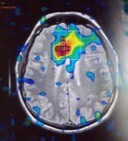RTOG Reports That Chemotherapy Added to Radiotherapy Improves Survival
by
Barbara Kram, Editor | November 25, 2008

ACR's RTOG reports
brain cancer finding
Lake Las Vegas, NV - Adult patients with low grade glioma, a type of malignant brain tumor, had a better chance for survival if they received chemotherapy in addition to their course of radiotherapy according to new research from the Radiation Therapy Oncology Group presented at the Society for Neuro-Oncology 13th Annual Meeting in Lake Las Vegas, NV. RTOG is a National Cancer Institute-funded national clinical trials group and is administered by the American College of Radiology.
"In this RTOG study we found that patients who survived at least one year from the completion of their treatment had much better survival and progression-free survival rates if they received chemotherapy in combination with radiotherapy," said lead author Edward G. Shaw, M.D., of the Wake Forest University School of Medicine, Winston-Salem, NC. "This is the first multi-center prospective clinical trial to suggest a benefit from adjuvant therapy in this patient population."
The 251 patients enrolled on RTOG 9802 were entered from academic and community-based sites in the United States and Canada from 1998 until 2002. High-risk low-grade glioma patients were randomized to receive either six weeks of radiotherapy alone or six weeks of radiotherapy followed by six cycles of chemotherapy consisting of procarbazine, CCNU and vincristine. RTOG found that for patients who survived at least one year post treatment, the risk of death was reduced by 43 percent and progression-free survival was reduced by 64 percent. With a median follow-up of 5.9 years, the overall five-year survival rate was 72 percent for the patients who received the additional chemotherapy as compared to 63% for those who received radiotherapy alone. The five-year progression-free survival rates were 63 percent versus 46 percent.
"There are a number of controversial issues in the management of low-grade gliomas, including which patients benefit from adjuvant therapy, and RTOG is one of the few groups that is able to study this patient population in a prospective manner," said Walter J. Curran, Jr., the RTOG Group Chair, and the Lawrence W. Davis Professor and Chair of the Department of Radiation Oncology in the Emory School of Medicine and Chief Medical Officer of the Emory Winship Cancer Institute. "With two-thirds of the patients still alive at five years we look forward to the long-term follow-up results for this study as well as analysis of the 1p19q genetic codeletion data."
In addition to Dr. Shaw, authors include: Meihua Wang, PhD, Radiation Therapy Oncology Group, Philadelphia, PA; Stephen W. Coons, MD, St. Joseph's Hospital and Medical Center, Phoenix, AZ; David Brachman, MD, Arizona Oncology Services Foundation, Phoenix, AZ; Jan Buckner, MD, and Paul Brown, MD, Mayo Clinic, Rochester, NY; Keith Stelzer, MD, PhD, Celilo Cancer Center, The Dalles, WA; Geoffrey Barger, MD, Wayne State University, Detroit, MI; Mark R. Gilbert, MD, University of Texas M. D. Anderson Cancer Center, TX; and Minesh Mehta, MD, University of Wisconsin-Madison, Madison, WI.
